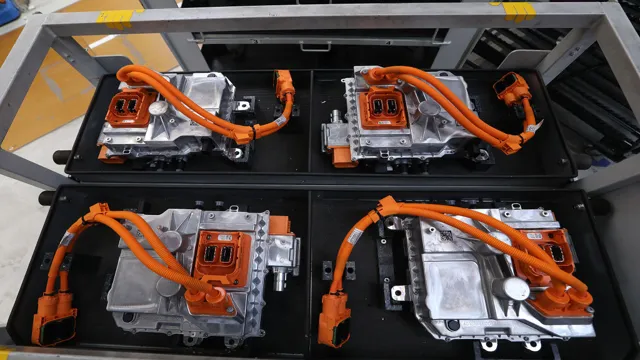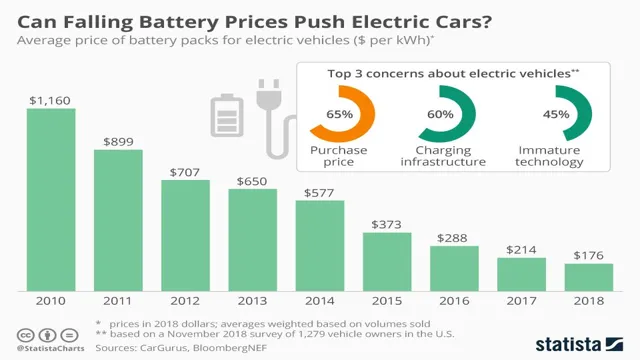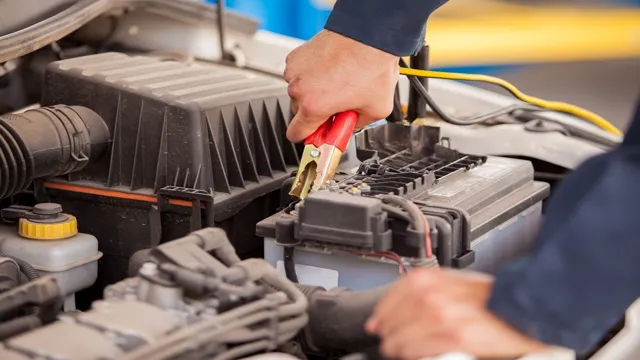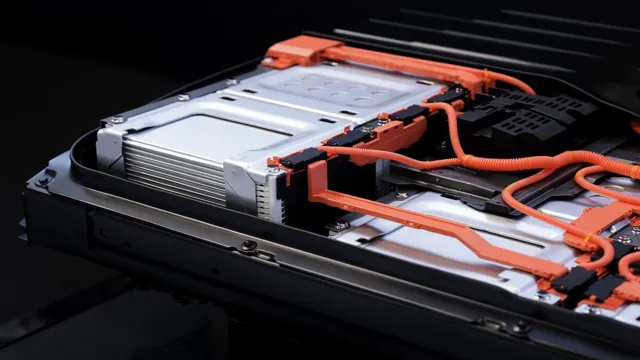Revive Your Ride: The Ultimate Guide to Battery Replacement in Electric Cars
As more and more electric cars hit the roads every year, the question of battery replacement becomes increasingly important. Unlike gasoline cars that can simply be refilled at a gas station, electric cars require a more intricate process to replace their batteries. However, with advancements in technology, battery replacement is becoming more affordable and accessible than ever before.
In this blog post, we’ll explore the different factors to consider when replacing an electric car battery, including cost, timeframe, and the overall impact on the environment. So if you’re a current or prospective electric car owner, keep reading to learn more about this crucial topic.
Why Replace Your EV Battery?
If you’ve been driving an electric car for a long period, you’ve probably noticed a decline in battery performance. As your car gets older, your battery may not hold the charge that it used to or may no longer provide you with the range that you need. In such a case, battery replacement in electric cars becomes a viable option.
There are several reasons why you might need to replace your EV battery, including a decline in battery health, a decrease in power, reduced range, or complete battery failure. If you notice any of these symptoms, it’s essential to speak with your manufacturer to determine if they can replace your battery. Fortunately, most EV manufacturers offer battery replacement programs to address this issue, and you can expect a new battery to dramatically improve the range and performance of your electric car.
So, don’t hesitate to replace your EV battery if you notice a decrease in its performance and enjoy an optimal driving experience again.
Decreased Range & Performance
If you’re an electric vehicle owner, you may have noticed a decrease in your EV’s range and overall performance over time. This can be frustrating, especially if you’ve invested a significant amount of money in your EV. But why is this happening? The most likely reason is that your EV battery is starting to degrade.
Batteries are the heart and soul of electric vehicles, and they are responsible for storing and releasing energy to power the vehicle. Over time, the cells within the battery degrade, and this results in reduced range and performance. If you’re experiencing this issue, it may be worth considering replacing your EV battery.
Not only will a new battery improve your vehicle’s performance, but it will also extend the lifespan of your EV. A new EV battery can give you peace of mind knowing that you can rely on your vehicle for years to come. So if you’re noticing a decrease in range and performance, don’t hesitate to reach out to a qualified electric vehicle technician to discuss your battery replacement options.

Increased Charging Time
As electric vehicles continue to grow in popularity, one of the most common issues that owners face is increased charging time. This can happen when the vehicle’s battery has degraded over time, making it less efficient at storing energy. If you find yourself in this situation, it might be time to consider replacing your EV battery.
A new battery can improve charging times, and provide better overall performance for your electric vehicle. Plus, with advancements in battery technology, new EV batteries are more advanced and efficient than ever before, meaning that you’ll be able to get more out of your electric vehicle with a new battery. While it may seem like a significant investment, replacing your EV battery can ultimately save you time and money in the long run, as it can improve the lifespan of your vehicle and reduce the need for costly repairs down the line.
So if you’re experiencing slower charging times, it may be worth exploring your battery replacement options to get the most out of your electric vehicle.
Battery Failure/Depletion
Replacing your EV battery is paramount if you want to maintain the efficiency and longevity of your electric vehicle. Over time, batteries tend to wear out and deplete, leading to reduced driving range and overall performance. Moreover, battery failure can also occur due to a variety of factors such as overheating, overcharging, or mechanical damage.
The consequences of battery depletion can be drastic, resulting in costly repairs and even rendering your EV unusable. Therefore, it makes perfect sense to replace your EV battery when it begins to lose capacity and exhibit signs of wear. By doing so, you can enjoy a hassle-free and smooth driving experience while minimizing the environmental impact of your vehicle.
Remember, a healthy EV battery is essential to ensure your EV performs at its best.
Factors Affecting Battery Life
When it comes to electric cars, battery replacement is an important factor to consider. The lifespan of an electric car battery depends on various factors such as temperature, charging habits, and usage patterns. Hot temperatures can cause the battery to degrade faster, reducing its overall life.
Similarly, frequent fast charging can also lead to premature battery degradation. It is crucial to use the appropriate charging equipment and charging pattern to avoid damaging the battery. Additionally, driving style can also affect battery life.
Aggressive driving and constant acceleration and deceleration can put additional strain on the battery. On the other hand, smoother and more conservative driving habits can help prolong the battery’s lifespan. Understanding the factors affecting battery life can help electric car owners make informed decisions and optimize the life and efficiency of their vehicle’s battery.
Temperature
Temperature When it comes to battery life, the temperature of the battery is a significant factor to consider. Extreme temperatures, both hot and cold, can significantly impact the lifespan of a battery. High temperatures can cause a battery to lose capacity over time, while low temperatures can cause the battery to discharge at a faster rate.
For example, leaving your phone in a hot car can cause damage to the battery, leading to a decrease in performance and lifespan. On the other hand, using your smartphone in extremely cold temperatures can cause the battery to drain rapidly. To maximize the lifespan of your battery, it’s crucial to store your device in a place where the temperature is moderate and avoid exposing it to extreme temperatures.
By doing so, you can prevent damage to your battery and ensure it lasts as long as possible.
Charging Habits
When it comes to prolonging the battery life of our devices, it’s important to understand the various factors that can affect its longevity. One of the biggest factors is our charging habits. For starters, it’s best not to let your device completely run out of battery before charging it.
Instead, try to charge it when it reaches around 20-30% battery life. Additionally, using a fast charger can be convenient, but it can also cause your battery to degrade quicker. Using a slow and steady charger is a better option in the long run.
Finally, it’s important to avoid overcharging your device. Once it reaches a full charge, unplugging it will not only save energy but also help prolong the life of your battery. By adopting these good charging habits, you can help ensure that your device’s battery stays healthy for longer.
Maintenance Practices
One of the most critical factors that affect battery life is maintenance practices. Proper maintenance can significantly extend the life of a battery, whereas neglecting your battery results in a shorter lifespan. One of the essential things to do is to keep your battery clean because dust and debris can build up on the terminals, causing a poor connection.
Use a soft cloth or a specialized terminal cleaner to keep the battery clean. Overcharging and undercharging can also shorten the battery’s life, so ensure you follow the manufacturer’s advice on charging times and run your battery down occasionally before recharging it. Extreme temperatures, hot or cold, can also adversely affect battery performance, so store your battery in a cool, dry place, away from direct sunlight and heat sources.
By taking care of your battery through proper maintenance practices, you can significantly extend its life and save money in the long run.
When to Replace Your EV Battery
Battery replacement in electric cars is one of the biggest concerns for EV owners. The good news is that electric car batteries are designed to last a long time. However, their lifespan can be affected by several factors, including usage patterns, environmental conditions, and manufacturing defects.
As a general rule, EV batteries are expected to last for around 8-10 years or approximately 100,000 miles before requiring replacement. Some manufacturers offer 8-year warranties on their battery packs, providing an idea of their lifespan. However, if you notice a significant decline in your EV’s range or performance, it might be a sign that your battery needs to be replaced.
Regular maintenance and monitoring of your battery’s health can help identify potential problems early on and prevent unexpected breakdowns. When it comes time to replace your battery, it’s essential to look for high-quality replacement options that meet the manufacturer’s specifications for your vehicle. A battery replacement in electric cars can be expensive, but choosing the right option can extend your EV’s lifespan and save you money in the long run.
Manufacturer Recommendations
As electric vehicles (EVs) become increasingly popular, it’s important to understand when to replace the battery. Thankfully, manufacturers provide recommendations for EV battery replacement based on a few factors. First, the battery degradation rate should be considered.
Most manufacturers suggest replacing the battery after it reaches 70-80% of its original capacity. Additionally, the battery’s age and mileage should be taken into account. Manufacturers will typically recommend replacing EV batteries after around 8-10 years or 100,000-150,000 miles.
It’s important to follow these suggestions to maintain the longevity and efficiency of your EV. While battery replacement can be costly, it’s a necessary investment to ensure your vehicle’s optimal performance.
Symptoms of a Failing Battery
As an electric vehicle owner, one of the most crucial components of your car is the battery. It’s what gives your car the ability to store and use energy to power the motor and move the car. However, like all batteries, the EV battery will eventually degrade and lose its capacity to hold a charge.
If you notice that your car’s range is decreasing, or it takes longer to charge than before, it could be a sign that the battery is failing. Another symptom is if your car doesn’t start or loses power unexpectedly. In these cases, it’s essential to have your battery checked by a professional technician to determine whether it needs replacement.
While batteries are an expensive component of an EV, replacing them can often be more cost-effective than continuing to suffer from declining performance. So, don’t hesitate to get a new battery if your car’s battery is showing signs of failure, as it can save you money in the long run and ensure your car’s reliability on the road.
Cost of EV Battery Replacement
Battery replacement in electric cars can be a daunting task for many car owners. While electric cars are known for their low maintenance costs, battery replacement can be quite expensive. The cost of replacing the battery in an electric car varies depending on the make and model of the vehicle.
For example, the cost of a Tesla Model S battery can range from $5,500 to $16,000 depending on the age of the car and the mileage. However, as technology advances, the cost of battery replacement for electric cars is expected to decrease. Despite the initial sticker shock, it is important to consider the long-term savings of owning an electric car.
With lower fuel costs and fewer maintenance requirements, electric cars can save car owners money in the long run. Additionally, many car manufacturers offer warranties that cover the cost of battery replacement for a certain number of years, giving car owners peace of mind. Overall, while battery replacement for electric cars may seem expensive, the benefits of owning an electric car far outweigh the costs in the long run.
Conclusion
In conclusion, replacing batteries in electric cars is not just a simple swap of power sources. It involves complex technology, precise engineering, and environmental considerations. But, just like getting a new phone battery, changing your car’s juice box can breathe new life into your ride and keep you cruising for miles to come.
So, dare to unplug and embrace the electric car revolution! After all, as Benjamin Franklin once said, “time is money” and in the case of electric cars, time saved at the petrol station is money in the bank.”
FAQs
What is a battery pack replacement in an electric car?
A battery pack replacement in an electric car is when the old battery pack is removed and replaced with a new one.
How often do I need to replace the battery pack in my electric car?
The lifespan of an electric car battery pack can vary depending on the make and model of the car, as well as usage patterns. Some manufacturers estimate a lifespan of around 100,000 miles, while others claim up to 200,000 miles.
Can I do a battery pack replacement myself, or do I need to take my electric car to a specialist?
Battery pack replacements should only be done by a certified specialist. This is because the battery pack is an integral part of the electric car’s powertrain system and requires specialized knowledge and tools for proper installation.
How much does a battery pack replacement cost for an electric car?
The cost of a battery pack replacement varies depending on the make and model of the electric car. Battery packs can range from a few thousand dollars to over $20,000 for luxury electric vehicles. It is recommended to check with your local dealer or repair specialist for an accurate estimate.





